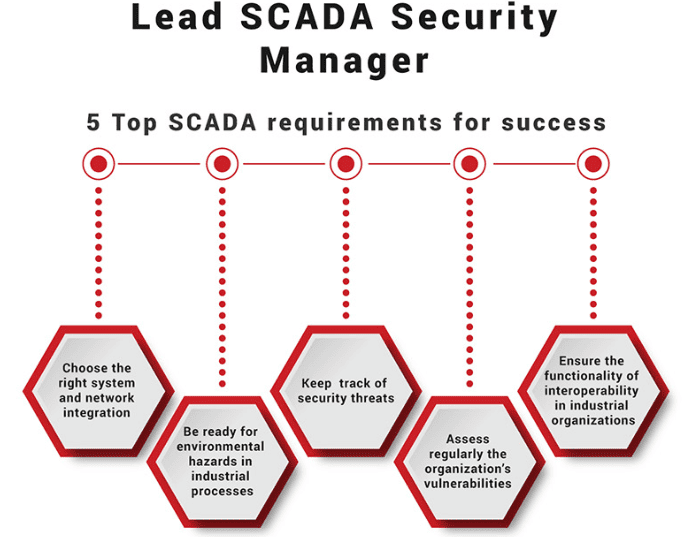SCADA Security Manager – Training Course
What is a SCADA system?
SCADA – Supervisory Control and Data Acquisition is an industrial system framework that includes both hardware and software architecture to control, monitor and analyze an industrial process. SCADA is an application software that enables managers, engineers, and industry operators, to supervise and communicate effectively with the working environment.
As an application software, SCADA is designed to assist industry experts in maintaining and improving industrial processes. Hence, the objective of SCADA is to collect real-time data, and store, process and generate reports for the complex industrial processes.
Why is it important to have a secured SCADA System?
SCADA is an essential tool that provides networking systems, communication and security technologies, and standards which are necessary to facilitate the maintenance of industrial processes. The application of technology is important for individuals to innovate and develop processes that will assist industries in the near future.
The aim of SCADA is to provide individuals with techniques to choose, plan and design technologies for improving the business processes and other utilities. In addition, SCADA will assist individuals to learn the required skills that are essential to plan, direct, operate and manage a project system in a working environment. The importance of SCADA is the automation system which allows the organization and individuals to anticipate risk uncertainties, lower investment, maintenance costs and study optimal responses to the continuity of industrial processes.
Benefits of SCADA Security Manager
By becoming a Certified SCADA Security Manager you will be able to:
- Develop a vulnerability assessment framework in SCADA Security
- Improve Access Control and Authentication Management
- Maximize your productivity and improve product quality
- Reduce your operating and maintenance costs
- Achieve long-term profitable investments

How do I get started with SCADA Training?
This PECB training course is designed to help managers, supervisors, and operators in the field of IT to discover how to configure the required tools and features for developing and organizing a SCADA projects in industrial processes. The PECB trainers are qualified and experienced professionals who are eager to share their knowledge and help you to achieve the goal of becoming a PECB Certified Lead SCADA Security Manager.
PECB Certified Lead SCADA Security Manager training course available
By attending PECB training courses you will acquire the required knowledge and confidence to attain professional certification and enhance your career. Grab the opportunity and explore the following training course on how to become a Lead SCADA Security Manager.
Why should you attend?
Lead SCADA Security Manager training enables you to develop the necessary expertise to plan, design, and implement an effective program to protect SCADA systems. In addition, you will be able to understand common Industrial Control System (ICS) threats, vulnerabilities, risks related to the Industrial Control Systems (ICS) and techniques used to manage these risks. This training focuses on several aspects of security management and skills related to SCADA/ICS security.
Lead SCADA Security Manager training course is designed by industry experts with in-depth experience in SCADA and Industrial Control Systems Security. Unlike other trainings, this training course concentrates specifically on the knowledge and skills needed by a professional seeking to advice on, or manage risks related to SCADA environments and systems. Given the high profile nature and the significant impacts associated with such environments, a holistic professional approach to security is needed and that is exactly what this course is designed to provide.
In addition, to acquire the theoretical knowledge needed by a SCADA Security Manager, a comprehensive methodology for the implementation of a SCADA Security program is presented. Thus, at the end of this course, you will gain knowledge on how to effectively implement a security program for SCADA/ICS systems.
After mastering all the necessary concepts of SCADA Security, you can sit for the exam and apply for a “PECB Certified Lead SCADA Security Manager” credential. By holding a PECB Lead SCADA Security Manager Certificate, you will be able to demonstrate that you have the practical knowledge and professional capabilities to support and lead a team in managing SCADA Security.
Who should attend?
- Security professionals interested in acquiring SCADA security professional skills
- IT professionals looking to enhance their technical skills and knowledge
- IT and Risk Managers seeking a more detailed understanding of ICS and SCADA systems
- SCADA system developers
- SCADA engineers and operators
- SCADA IT professionals
Learning objectives
- Understand and explain the purpose and risks to SCADA systems, Distributed Control Systems and Programmable Logic Controllers
- Understand the risks faced by these environments and the appropriate approaches to manage such risks
- Develop the expertise to support a pro-active SCADA Security program, including policies and vulnerability management
- Define and design network architecture incorporating defense in advanced security controls for SCADA
- Explain the relationship between management, operational and technical controls in a SCADA Security program
- Improve the ability to design resilient and high availability SCADA systems
- Learn how to manage a program of effective security testing activities
Educational approach
- This training is based on both theory and best practices used in SCADA Security
- Lecture sessions are illustrated with examples based on case studies
- Practical exercises are based on a case study which includes role playing and discussions
- Practical tests are similar to the Certification Exam
Prerequisites
A fundamental understanding of SCADA Security.
Course Agenda
Day 1: Introduction to SCADA and ICS
Day 2: Designing a Security Program and Network Security Architecture
Day 3: Implementing ICS Security Controls, Incident Management and Business Continuity
Day 4: Security testing of SCADA systems
Day 5: Certification Exam
Examination
The “PECB Certified Lead SCADA Security Manager” exam fully meets the requirements of the PECB Examination and Certification Programme (ECP). The exam covers the following competency domains:
Domain 1: Fundamental principles and concepts of SCADA and SCADA Security
Domain 2: Industrial Control Systems (ICS) characteristics, threats and vulnerabilities
Domain 3: Designing and developing an ICS Security Program based on NIST SP 800-82
Domain 4: Network security architecture for SCADA systems
Domain 5: Implementation of security controls for SCADA systems
Domain 6: Developing resilient and robust systems
Domain 7: Security testing of SCADA systems
For specific information about exam type, languages available, and other details, please visit the List of PECB Exams and the Examination Rules and Policies.
Certification
After successfully completing the exam, you can apply for the credentials shown on the table below. You will receive a certificate once you comply with all the requirements related to the selected credential. For more information about SCADA certifications and the PECB certification process, please refer to the Certification Rules and Policies.
To be considered valid, these activities should follow best practices and include the following:
- Understanding an organization and its context
- Defining a SCADA approach
- Selecting a SCADA methodology
- Defining SCADA criteria
- Identification of assets, threats, existing controls, vulnerabilities and consequences (impacts)
- Assessing consequences
- Determining the level of security programs in SCADA systems
- Evaluating SCADA system scenarios
- Evaluating SCADA system treatment options
- Selecting and implementing controls
- Performing a SCADA review
General Information
- Certification and examination fees are included in the price of the training course
- Training material containing over 450 pages of information and practical examples will be distributed
- An attestation of course completion worth 31 CPD (Continuing Professional Development) credits will be issued to the participants who have attended the training course.
- In case of exam failure , you can retake the exam within 12 months for free







